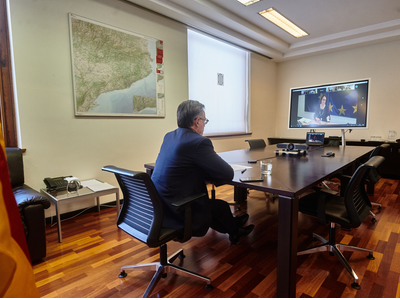
The Minister of Business and Knowledge, Ramon Tremosa, has emphasized the role of small and medium-sized enterprises in the recovery of the Catalan economy after COVID-19 crisis, and has thus claimed “not to exclude SMEs” in the selection process for European funds from the Next Generation EU Programme. In her participation in the Technical Session of the Conference of Spain's Autonomous Community Presidents, Tremosa stated that the state will centralize the resources and decide on their distribution no matter the commitment of the President of the European Commission, Úrsula von der Leyen, to place regions and cities at the centre of the Next Generation EU Programme. "The Commission has told us that the weight of SMEs will be taken into account by each state, and right now we have no information regarding Spanish State’s intentions”, he explained.
During the meeting, Tremosa requested for Catalonia, as administration with a better knowledge of the business reality in the country, to directly manage its share of the funds corresponding to the programme, and he also asked for “a direct relationship between Catalonia and the European Commission, which is already the case in other funds”. At the request of the Minister, the representatives of the Commission have certified that the States will be its interlocutors. "Unlike other European funds, this will not be a competitive, open and transparent process, and this is bad news for Catalonia", lamented Tremosa.
Tremosa has expressed the need for the Spanish state to spend all the money —140.000 million— received from the European institutions and to “ensure it is spent to finance specific projects and not current expenditure”. In addition, the Minister reiterated that the principle of financial sustainability should guide the project selection, so these resources generate a multiplier effect on economic growth. In this regard, the Minister welcomed the fact that the European Commission “has ensured that the payments made will be conditional on objectives" , and also because it has emphasized both cross-border projects and specific recommendations to the Member States, including projects such as the Mediterranean corridor in Spain. "For some decades now, this project was claimed and never materialized", he summed up.
At the end of the meeting, Tremosa described as a “fantastic opportunity” the fact that Europe agrees on issuing joint public debt to finance the “industrial, technological, ecological and energy recovery” of the economies of the Member States of the EU. In turn, he also warned that the Next Generation EU Programme is a great opportunity for Spain to do things differently from how it was done so far, and warned that "if mismanaged, Spain will not only suffer a deep economic crisis, but also a rescue”.
Finally, Tremosa also highlighted the assets of the Catalan economic fabric in generating activity and creating new projects, and highlighted the 8,900 multinationals installed in the country, the long tradition of public-private collaboration or the close relationship between universities and companies, among others. A few weeks ago, the Department of Business and Knowledge already announced that it had identified 68 business projects that could apply for funding from the Next Generation EU Programme.


